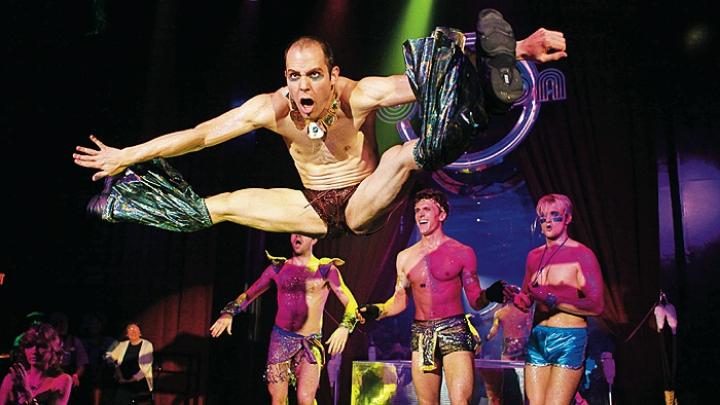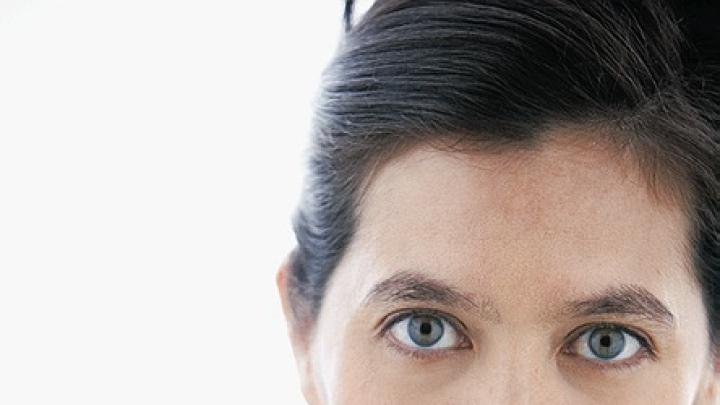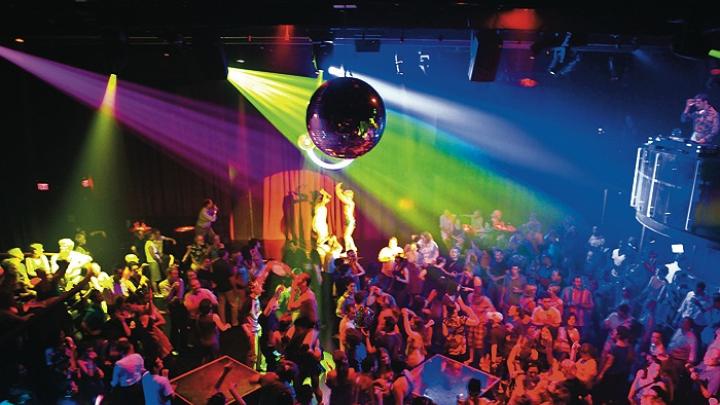Immediately after college, Diane Paulus ’88 returned home to New York City and enrolled in a two-year training program at The New Actors Workshop. It’s a prestigious program: Hollywood director Mike Nichols and theater director Paul Sills taught her. On the final night, several students stayed up late at a café, saying goodbyes and discussing their ambitions. Some just wanted to get an agent. Some wanted to become film stars; others hoped to act or direct on Broadway or do improv comedy or win a lead role on a TV series. Paulus announced a different goal. “I want to be Robert Brustein,” she said, “and run the American Repertory Theatre.”
This past summer, nearly two decades later, she realized her dream, becoming artistic director of the repertory company that Brustein, professor of English emeritus, founded at Yale and brought to Harvard’s Loeb Drama Center nearly 30 years ago. She brings an ambitious vision of what the ART (American Repertory Theater, the spelling of “Theater” now anglicized at her suggestion, accenting its “American roots”)—and theater in general, should be. “I’m deeply interested in the audience,” she says. “I’m a populist. I believe in the audience’s intelligence, and want them to have a voice. Opera is the one theatrical place in America where people will actually boo. Why? Because opera fans are so passionate about what they believe and what they want. I would rather have an audience boo than fall asleep.”
More often, her audiences have been singing, dancing, and cheering. For The Donkey Show, her first ART production, Paulus (with her husband and collaborator, Randy Weiner ’87) has changed the company’s Zero Arrow Theatre into a club named OBERON, a 1970s disco setting for a radically re-imagined version of A Midsummer Night’s Dream. (The renaming of Zero Arrow, reportedly, is permanent.) The audience throngs into the nightclub (yes, adult beverages are available) and dances for the first half-hour amid a cast, in costume and in character, that mingles and dances with them. Four Fairies—chiseled young men wearing little more than glorified loincloths and eyeliner—gyrate atop cubes on the dance floor and invite theatergoers to gyrate with them. The play unfolds in blackout sketches that pop up in spotlights all over the room, played at times almost literally in audience members’ laps. Not a single word of Shakespeare’s dialogue is uttered, but the action is true to his characters and their relationships, and moves ahead via disco anthems like “I Love the Nightlife,” “We Are Family,” and “Last Dance.”
The Donkey Show, which premiered in 1998 in New York and has since run in Edinburgh, London, Madrid, and Evian, France, is the first of Paulus’s “Exploding Shakespeare” triptych, the trio of productions that open her first season. For October, she booked the innovative British theater company Punchdrunk to stage—install might be a better word—Sleep No More, “an immersive production inspired by Shakespeare’s Macbeth, told through the lens of a Hitchcock thriller” at the Old Lincoln School near Brookline Village, Massachusetts. In late November, The Best of Both Worlds will tell The Winter’s Tale with the musical sounds of R&B and gospel. (An unexploded Winter’s Tale, performed by the ART’s Institute for Advanced Theater Training class of 2010, was also on the Loeb theater docket for early October.)
“I am serious about the mission of ART—to expand the boundaries of theater,” Paulus says. “I am very passionate about theater not being defined as an ‘elite’ art form. I want to see it return to a vibrant, vital place, not only as a center of culture, but at the center of our society. In fifth-century B.C. Athens, theater was at the center of social and religious life; Aeschylus was competing with Sophocles amid the birth of democracy. The theatrical experience should not be confined to rituals of what we think theater is—to sit in chairs bolted to the floor: that’s one kind of theater. Look at Indian culture or medieval Europe—theater hasn’t only been about realism and naturalism.
“[Richard] Wagner said to turn the house lights out to keep the audience focused on the stage,” she continues. “But people once went to the theater to flirt—to see other people in the boxes, to eat and drink and shout. For the groundlings of Shakespeare’s day, it was very earthy. I look at other forms of live entertainment—pro wrestling, rock concerts—to get my inspiration.”
Paulus grew up as a “theater arts kid” in New York City; her father acted and directed, and she danced with the New York City Ballet as a girl and studied piano for 10 years. But “practicing piano six hours a day by myself didn’t feel like the heart of what the arts meant to me,” she says. “I loved the creative process in a group—many people coming together and making something great.” There were four formative years of the “wild creative activity that undergraduates engage in” at Harvard, where Paulus co-founded CityStep, “haunted the Loeb,” and wrote a senior social-studies thesis on The Living Theatre, the New York-based experimental theatre group. She didn’t want to be an actor “and wait by the phone, hoping for a job,” so after completing her two-year workshop training, she earned an M.F.A. in directing at Columbia; she has worked as a freelance director since 1997. Paulus has done plenty of musical theater, including opera (all the Mozart-Da Ponte operas, for example) and, two years ago, a London opera based on the David Lynch film Lost Highway. In 2007 and 2008, she directed a revival of Hair in Central Park and then took it to Broadway, where it won a 2009 Tony Award.
Traditionally, at the end of Hair, the audience mounts the stage and dances until they are spent. That’s part of the plan. “You’ve touched them and made some kind of transformation,” Paulus explains. “You want that to have an outlet. It’s not just the play on the stage—it’s the gathering of people.” Paulus’s invitation is direct and sincere: “Come be in my shows.”










